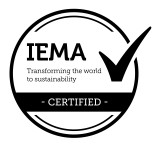Bruce Harper
With over 15 years’ experience working in the environmental and sustainability sector, Bruce Harper has a comprehensive knowledge of the challenges that pursuing sustainability places on all stakeholders. An environmental engineer with experience working in the public, private and regulatory sectors, he is happy to share his deep sectoral knowledge. Bruce previously worked with the Environmental Protection Agency as a licencing inspector. Later he moved into policy development, leading on industrial emissions as a policy officer in the Department of the Environment Northern Ireland. Bruce is passionate about communicating the need to decarbonise business activities and enjoys helping companies make transformative changes to address the climate and biodiversity challenges and embrace the circular economy.
Bruce enjoys helping organisations reconsider what’s possible for their organisation within the context of what’s necessary globally. Bruce makes the challenges facing organisations simple and easy to understand. Sharing his multiple perspectives from time as a policy maker, regulator and consultant, he invites people to explore how their organisations can transition to a sustainable future. He provides advice on the best tools to frame, scope and accelerate their transition as well as clearly identifying the risks associated with business as usual.
Finbarr Stapleton
Finbarr Stapleton, Antaris, has a B.Sc. in Industrial Chemistry and a Diploma in Occupational Health & Safety and is a member of IOSH. He has over thirty years experience, initially as Laboratory Manager in an Analytical Laboratory, a number of years experience as an EHS Manager in the Food Industry and subsequently in technical consultancy.
He has successfully implemented OHSAS 18001/45001, ISO 9001, ISO 14001 and ISO 50001 in a large number of industries. He has extensive experience of quality management and environmental and health and safety management systems, energy management, waste management as well as environmental and health and safety legislation. He is a qualified Auditor of ISO 9001, OHSAS 18001/ISO 45001, ISO 14001 and ISO 50001 management systems. Finbarr has also extensive experience of energy management systems such as ISO 50001. He has carried out a number of projects on behalf of the Sustainable Energy Authority of Ireland (SEAI).
He regularly carries out audits and risk assessments for client companies. He has also qualified as a dangerous goods safety adviser.
Finbarr has assisted a number of companies in making successful applications to the EPA (Environmental Protection Agency) for an IPPC (Integrated Pollution Prevention & Control) licence and has also carried out Environmental Impact Assessments for a number of companies.
Finbarr also holds an NUI Certificate in Training and Continuing Education. He is the lead tutor for the Nebosh International Certificate and Diploma courses.
Gerry Higgins
With extensive experience of implementing quality, environmental, health and safety, asset, energy and information security management systems and advising companies on how to integrate them, Gerry adopts a very practical approach to designing, implementing and maintaining management systems and brings this expertise to any training course, which he delivers.
Gerry has carried out first-, second- and third-party audits in a number of jurisdictions and across a range of organisations involved in manufacturing and service industries in both the public and private sector. He has also assisted many companies to demonstrate compliance with their statutory and regulatory requirements.
He has consulted with companies on developing appropriate sustainability, decarbonisation and energy transition strategies and on enhancing their circular value chains.
He has a degree in engineering and an MBA from the University of Limerick and is a chartered engineer and Fellow of Engineers Ireland. He is also a Fellow and chartered environmentalist through IEMA and holds a Certificate in Circular Economy & Sustainable Strategies from the University of Cambridge
Gerry is CEO of Antaris, which he founded in 1994. Antaris is at the forefront of climate action in Ireland and is a signatory to the science-based target initiative (SBTi), which commits us to reducing our absolute scope 1 and scope 2 GHG emissions by 50% by 2030 from a 2019 base year, and to measure and reduce our scope 3 emissions. Antaris is also a member of 1% for the Planet, committing us to donating 1% of our annual gross revenue (sales, not profit) to grassroots environmental organisations dedicated to protecting our planet.
Peter Fleming
Peter Fleming is an accomplished EHSQ professional with credible technical insight coupled with best-in-class interpersonal and communication skills. In the last 14 years, he has specialized in the areas of HAZOP, risk assessment, process safety, fire safety and industrial loss prevention. Peter Has worked with over 300 organizations in Europe, China, Middle East, America, Central America primarily focusing on HAZOP studies and Risk Assessment.
Currently, he has been coordinating a number of HAZOP and SIL studies in Jubail and Saudi Arabia. He has also worked as a safety expert responsible for assessing the safety of Ma’aden operations and processes and preparing a safety risk register for Ma’aden Phosphate Company. His work encompassed beneficiation, ammonia, 3 sulfuric acid, 3 phosphoric acid and 4 diammonium phosphate plants. He has also completed a number of HAZOP studies in Saudi Arabia and Qatar for a number of clients.


 Snapshot
Snapshot



